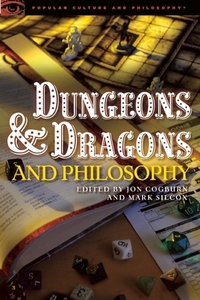Take a photo of a barcode or cover
2 reviews for:
Dungeons and Dragons and Philosophy: Raiding the Temple of Wisdom
Mark Silcox, Jon Cogburn
2 reviews for:
Dungeons and Dragons and Philosophy: Raiding the Temple of Wisdom
Mark Silcox, Jon Cogburn
To those reviewers who think this represents some kind of academic philosophy, you are seriously mistaken. This is in no way remotely approaching academic. What it is, is an attempt to bring some philosophical ideas to the masses. Perhaps it accomplishes that for some but, honestly, it is mostly a failure.
There were 2 fairly good essays which I will call out below, but most were insipid failures at best. They ramble on about their authors' experiences while barely bringing in any philosophical issues or doing so poorly. I truly struggled to get through this and I do still read some academic philosophy, which while often quite the slog is also generally a useful one. Not so here.
Essay 15 by Carl Ehrett and Sarah Worth, What Dungeons and Dragons Is and Why We Do It, is great in its first half where it focuses on games (and concepts) making good use of Wittgenstein. Its back portion on narrative/storytelling is OK but the authors ought pull their heads out of their philosophy bubble and look at some other theories on narrative where great strides have been made in the last decade or two. It would have been a much stronger paper.
Essay 21 by D. Aldridge, To Know My Character Better Than He Knows Himself, was also pretty good. And gets props from me for using R.G. Collingwood (via Gadamer).
The early section on ethics was particularly horrendous, which is a real shame as it could have easily been one of the strongest.
There were 2 fairly good essays which I will call out below, but most were insipid failures at best. They ramble on about their authors' experiences while barely bringing in any philosophical issues or doing so poorly. I truly struggled to get through this and I do still read some academic philosophy, which while often quite the slog is also generally a useful one. Not so here.
Essay 15 by Carl Ehrett and Sarah Worth, What Dungeons and Dragons Is and Why We Do It, is great in its first half where it focuses on games (and concepts) making good use of Wittgenstein. Its back portion on narrative/storytelling is OK but the authors ought pull their heads out of their philosophy bubble and look at some other theories on narrative where great strides have been made in the last decade or two. It would have been a much stronger paper.
Essay 21 by D. Aldridge, To Know My Character Better Than He Knows Himself, was also pretty good. And gets props from me for using R.G. Collingwood (via Gadamer).
The early section on ethics was particularly horrendous, which is a real shame as it could have easily been one of the strongest.
As part of Open Court's Popular Culture and Philosophy series, Dungeons and Dragons and Philosophy: Raiding the Temple of Wisdom was exactly what I expected it to be. This collection of essays explores a variety of philosophical questions about Dungeons and Dragons.
From considering the ethics of D&D by examining the alignment system and its implications on reality to looking at D&D as a new form of art, this book has something for anyone interested in philosophy regardless of their familiarity with D&D.
This book is not so much about D&D as it is about philosophy but it will certainly appeal to any reader who has considered the function of D&D and the question of why we play games.
Despite the fact that I am not a philosopher and have only played D&D about a dozen times, I enjoyed Dungeons and Dragons and Philosophy: Raiding the Temple of Wisdom because it made me think about D&D and other games on a deeper level.
3.5/5
From considering the ethics of D&D by examining the alignment system and its implications on reality to looking at D&D as a new form of art, this book has something for anyone interested in philosophy regardless of their familiarity with D&D.
This book is not so much about D&D as it is about philosophy but it will certainly appeal to any reader who has considered the function of D&D and the question of why we play games.
Despite the fact that I am not a philosopher and have only played D&D about a dozen times, I enjoyed Dungeons and Dragons and Philosophy: Raiding the Temple of Wisdom because it made me think about D&D and other games on a deeper level.
3.5/5
